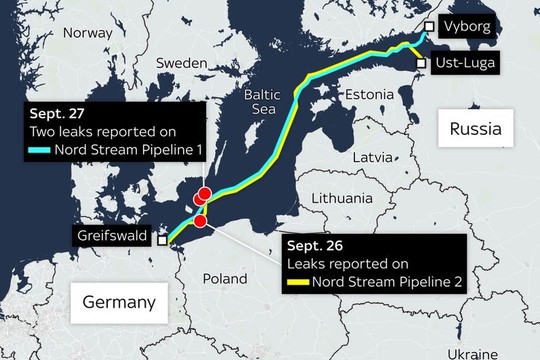As a result of a gas leak and pressure drop detected on both lines of the Nord Stream, the supply of blue fuel from Russia to Europe became formally impossible. Now the EU depends not on Russian gas, but on more expensive American gas, writes Iranian ‘Javanonline’.
After the accident on the Nord Stream 1 and Nord Stream 2 gas pipelines and the cessation of gas supplies to Europe along these lines, it probably seemed to many that no matter who was behind this sabotage and whoever was its executor.
Perhaps the assumption that Russia is deprived of trump cards in connection with the supply of energy resources to Europe has a right to exist. Perhaps the winners are the United States, which also periodically expressed "concern" about Europe's dependence on Russian energy carriers and persistently offered Europe its own liquefied gas as an alternative to Russian. But does this change anything for Europe itself?
The supply of Russian gas to Europe has already become formally impossible. In fact, it turned out to be impossible even earlier, due to the unfinished maintenance of one of the turbines, which anti-Russian sanctions prevented from repairing in a timely manner.
Literally a day after the accident on Russian gas pipelines in the Baltic Sea, which the world media began to call "acts of sabotage", another significant event takes place – the opening of the Baltic Gas Pipeline, also laid across the Baltic Sea and connecting Norway and Poland. Somebody began to look for a relationship between these two events.
This Baltic Gas Pipeline was designed to reduce the dependence on Russian energy resources that has oppressed the European Union in recent years. The capacity of this pan-European gas pipeline is 10 billion cubic meters annually. However, the recently opened gas pipeline is expected to be able to operate at full capacity only in November this year, that is, by the very beginning of the winter season.
The main task of the Baltic Gas Pipeline, the opening of which Polish politicians were so happy about, is not at all deliveries to Poland; rather, the pipeline is part of a more global North-South European gas corridor, which, at a later stage, should supply Scandinavian gas to European countries located along the shores of the Adriatic and Aegean seas.
It is also interesting to note that the physical damage to Nord Stream and the opening of the Baltic Pipeline occurred at a time when Russia and Europe were in a negotiation process, both on gas supplies and on the conflict in Ukraine. Now these negotiations lose all meaning.
Thus, the real winner in recent developments is the United States, which benefits both from increased exports of its own liquefied natural gas to Europe, and from continued tensions between Europe and Russia. Russia's ability to influence the situation in Europe is now in fact significantly reduced, but Europe's dependence on the United States is growing even more.
Europe, on the other hand, does not receive practically any gain from recent events, except, perhaps, moral satisfaction: now it depends not on Russian gas supplies, but on supplies of more expensive American gas.
It becomes clear who could benefit from the sabotage at Nord Stream, and who could play an organizing role in this sabotage. And although the cause of the accident is yet to be established by an investigation, there is already little doubt that it was a sabotage.
So Europe should hardly be glad that it has ceased to depend on gas supplies via Nord Stream. After all, the Baltic Gaz Pipeline is just not as immune from sabotage as Nord Stream was not immune from them.
And it will be very interesting to watch the further metamorphoses of the policy of European countries, if something happens like this.
read more in our Telegram-channel https://t.me/The_International_Affairs

 10:23 04.10.2022 •
10:23 04.10.2022 •























